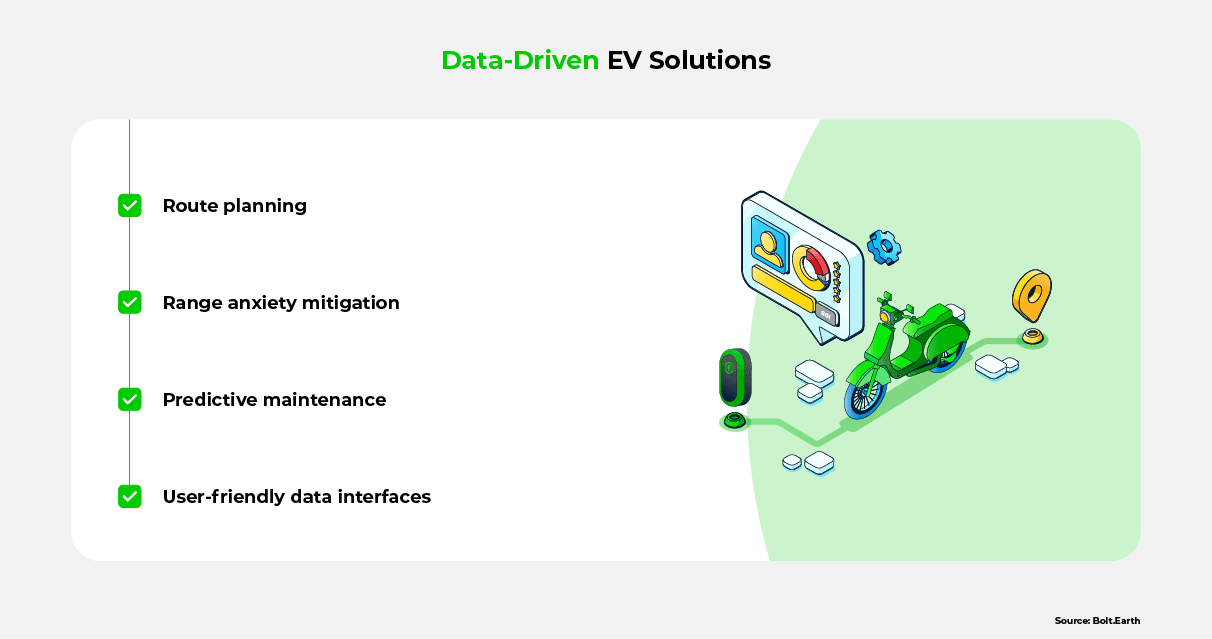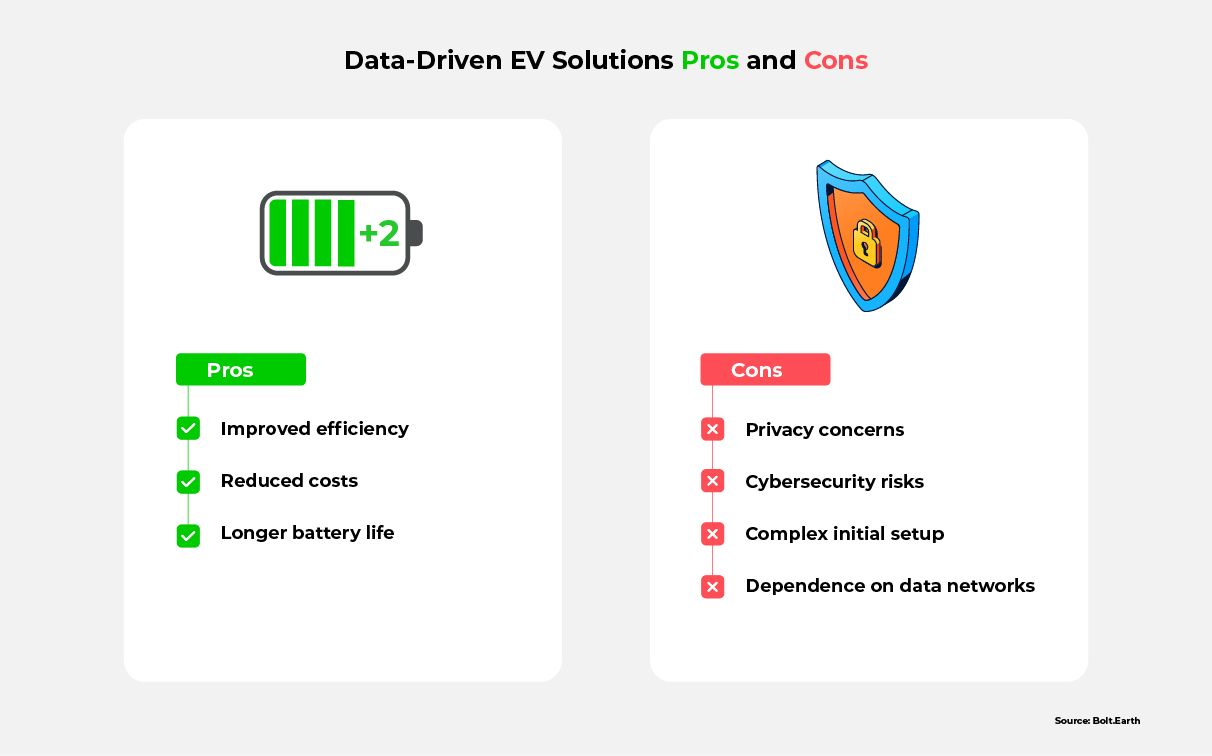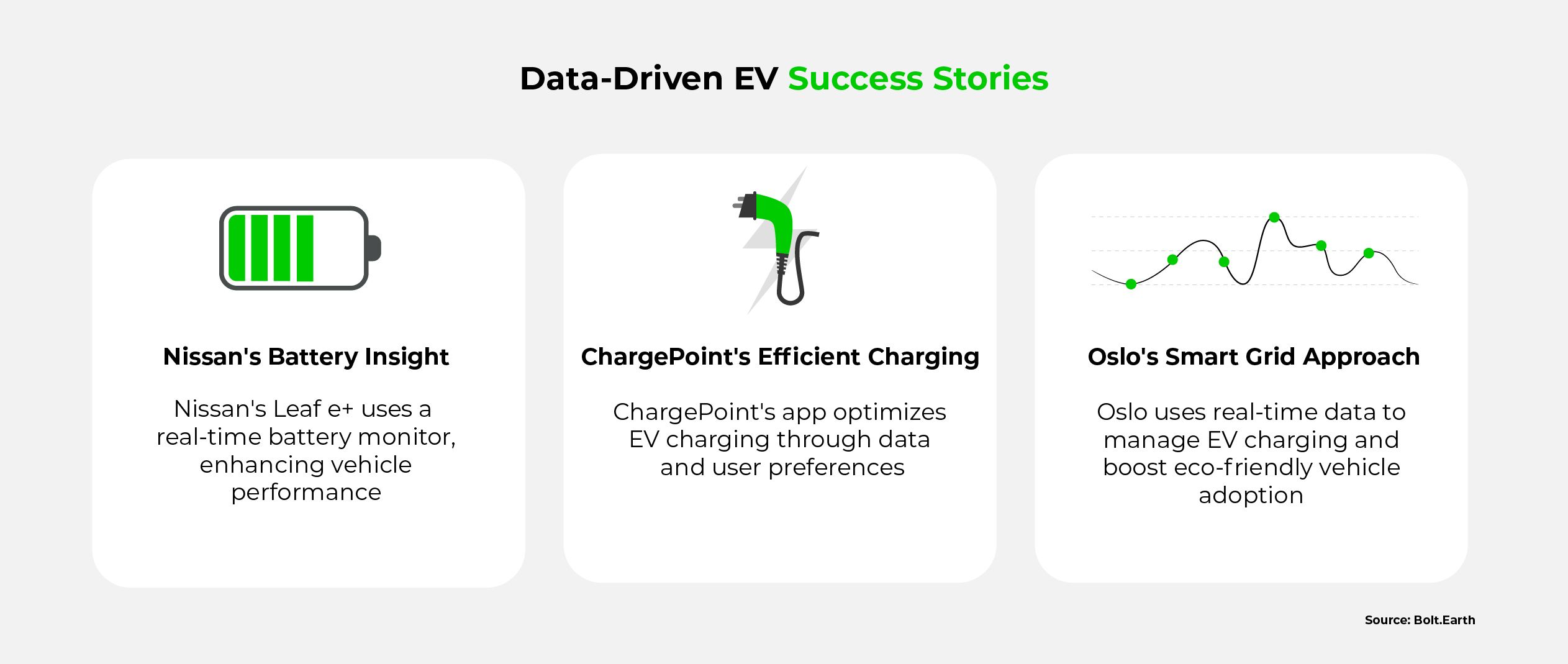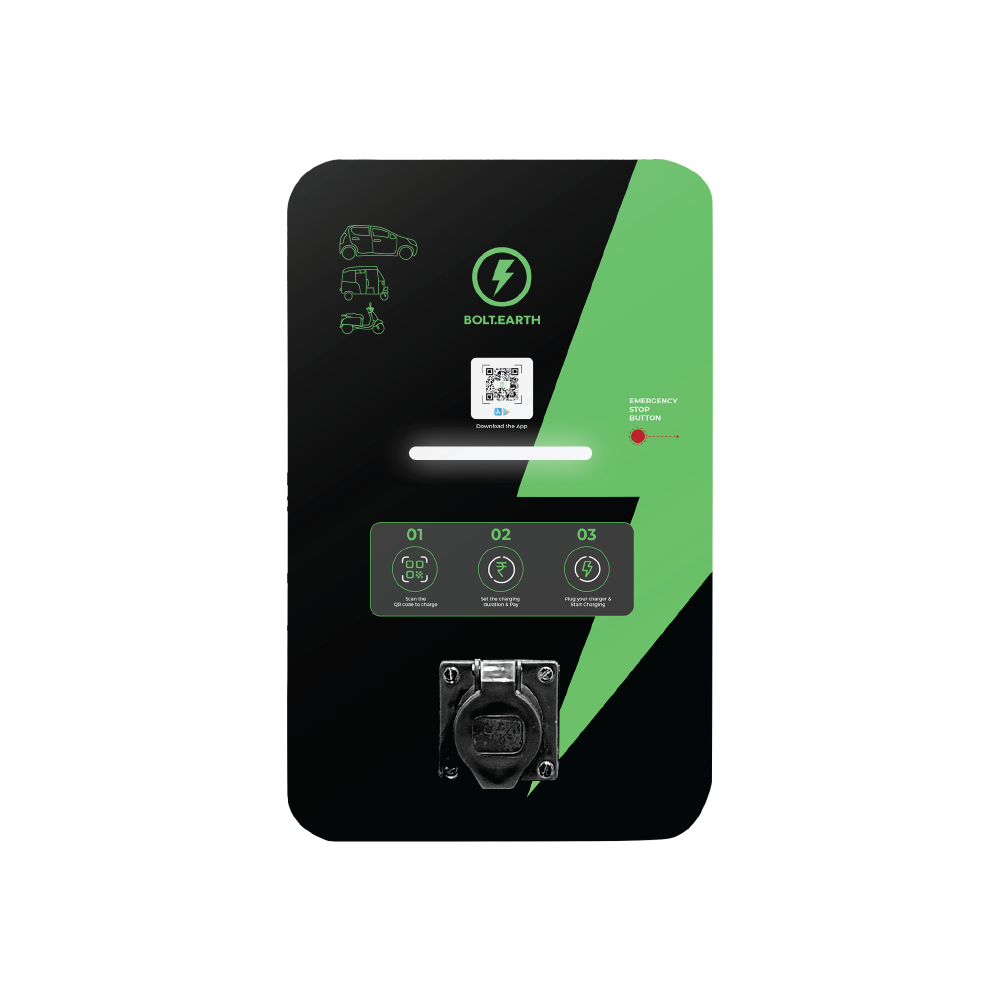How Data Insights Maximize EV Performance
Raghav Bharadwaj
Chief Executive Officer
Published on:
28 Nov, 2023
Updated on:
24 Nov, 2025

Electric vehicle (EV) automakers are increasingly integrating software platforms and components to improve their vehicles’ efficiency and meet users’ evolving needs. With the expansion of EV charging infrastructure and growing investments, EV adoption is on the rise.
To leverage this growing momentum, the industry aims to refine the performance and efficiency of EVs. Currently, EVs convert around 77% of electrical energy from the grid. While this is notably higher than gasoline vehicles’ 12 to 30% conversion rate, there’s potential for improvement. By innovating in battery technology and harnessing data-driven analytics, challenges such as range anxiety can be addressed, bolstering EVs as a preferred sustainable mobility option.
To better understand the role of data insights in improving EV efficiency and sustainability, this article answers three questions:
- How can data help make EVs better and solve EV owner problems?
- What are the pros of using data to improve EVs? If there are cons, what are they, and how does one overcome them?
- How have people and businesses used EV data to make things more efficient?
Common Challenges in EV Adoption
Despite the compelling environmental and economic benefits, EV adoption has been slower than expected due to challenges including high cost, limited range, frequent recharging needs, and lagging charging infrastructure. However, different governments’ strict laws and pollution standards have made it mandatory to decarbonize the transport sector.
Bridging these challenges with mandatory emission standards can be filled by data-driven insights, addressing range anxiety, charging time concerns, and data deficiency.
Range Anxiety
Range anxiety, or the fear of depleting charge before reaching a charging station, is a common concern among EV users. Leveraging data analytics to better understand the usage patterns of a charging point, Stakeholders can make informed decisions, bolstering charging infrastructures in high-demand areas.
Charging Time Concerns
A significant drawback of EVs is their prolonged charging times. Level 1, or slow charging points, can take five to six hours to charge with a driving range of two to five miles per hour. Level 2 charging points charge in one to two hours with a driving range of 10 to 20 miles per hour. To alleviate long charging times, data analytics can help operators pinpoint less crowded stations, directing EV drivers to them and minimizing wait times.
Data Deficiency
Comprehensive insights on EV usage patterns, charging times, and power grid utilization can help policymakers understand the current state of EV charging infrastructure and its impact on EV adoption. Using this data, they can formulate policies to make EVs more sustainable. Similarly, original equipment manufacturers and fleet managers can use this EV data to better understand customer and driver preferences and improve efficiency.
Besides addressing the above challenges, data-driven solutions can also help EV users.
Data-Driven EV Solutions
Data isn’t solely for policymakers and infrastructure providers – it’s also essential for EV users and fleet operators. Tapping into these insights can address several concerns.

Route Planning and Range Anxiety Mitigation
Many EV users lack clarity about their vehicle’s performance. With data analytics, they can plan better, optimizing their travel routes. Charging apps can guide users in real time, suggesting less congested charging stations or efficient routes based on battery levels, mitigating range anxiety.
Predictive Maintenance
Continuous data collection, especially from components like Battery Management Systems (BMS), IoT microcontrollers, and other accessories, facilitates predictive maintenance. By pre-emptively identifying issues through analyzing data to monitor the EV’s health, it can provide early warnings of potential problems, extend the lifespan of critical components, and reduce long-term ownership costs.
User-Friendly Data Interfaces
Clean and intuitive user interfaces are the key to making data and analytics accessible to EV users and fleet operators. App developers must design user-friendly interfaces so users can gauge their EV’s performance, charging habits, and maintenance needs. Additionally, apps offering personalized recommendations and insights enable users to make the most of data-driven insights.
Such concerted efforts from all stakeholders can enable the industry to better utilize the data generated from EVs and charging points.
Pros and Cons of Data-Driven EV Solutions

Pros
Improved Efficiency
Data-driven solutions can optimize routes, charging times, and driver behavior, leading to increased efficiency of EVs. By empowering EV users and fleet operators with actionable data insights, they can maximize vehicle potential. Over time, this can widen EV adoption by making it an environmentally and economically viable mobility choice.
Reduced Costs
A key advantage of harnessing EV data insights is the potential for monetary savings. Data-driven predictive maintenance can extend the lifespan of EV components like batteries, reducing upkeep and replacement costs. Optimized charging strategies can also lower electricity expenses, providing long-term financial benefits.
Longer Battery Life
Battery replacement costs are a deterrent to EV adoption. Given that the cost of replacement ranges from INR 15,000 to INR 20,000 per kWh (with a mid-range EV battery being 30-40 kWh) and INR 30,000 for EV two-wheelers. Leveraging data insights allows for adaptive driving habits that can prolong battery life, increasing overall vehicle value.
Cons
Privacy Concerns
The process of data collection and analysis creates privacy concerns among EV users. The comprehensive data collected from EVs often include personally identifiable information (PII). Mismanagement or mishandling of this data can lead to potential data misuse. Addressing this requires rigorous data security measures at multiple levels to protect sensitive information and prevent unauthorized access, increasing trust and confidence in the data-driven approach.
Cybersecurity Risks
Cybersecurity is intrinsically linked to the EV ecosystem. Given the interconnected nature of EVs, with ties to the power grid, transportation networks, and smart city infrastructure, the emphasis on cybersecurity is paramount. Hence, cybersecurity needs to be embedded during manufacturing and development.
Complex Initial Setup
Generating EV data insights requires the installation of sensors and smart charging equipment. This can be expensive and require a high level of technical expertise. For some users, downloading and configuring the software can seem daunting. One way to alleviate this downside is to create a user-friendly setup process and offer comprehensive support resources.
Dependence on Data Networks
EV data insights often rely on data networks for real-time updates and recommendations. Certain features might underperform in areas with poor network coverage, potentially frustrating users. A solution to this downside is to bolster offline capabilities and integrate alternative operational methods, ensuring a seamless user experience.
Despite these challenges, the traction for EV data insights remains robust.
Current Market Trends and Expert Insights
The EV market is undergoing a major transformation, largely driven by data insights. Market leaders like Tesla and Nissan are harnessing real-time data to boost battery efficiency and overall user experience. The prevalence of user-centric mobile apps continues to grow, enabling users easy access to valuable data insights. These apps provide personalized recommendations for efficient driving, route planning, and charging schedules to enhance user experience, fostering greater EV acceptance.
Moreover, urban planners are integrating these data-driven insights into their plans. Technological advancements, including bidirectional charging and vehicle-to-grid (V2G) technology, are reshaping EV and grid interactions, leading to power distribution and usage efficiency. Additionally, artificial intelligence (AI) is improving predictive maintenance capabilities, extending the lifespan of critical components.
These developments promise a cleaner, smarter, and greener future. More importantly, stakeholders actively leverage these data-driven insights, recognizing their transformative benefits.
EV Success Stories
Success stories provide valuable information into how organizations leverage data insights to improve EV performance and how these enhancements influence consumer choice and experiences.

Case Study 1: Nissan’s Battery Health Monitor
Nissan’s battery health monitor tracks 288 lithium-ion cells within its Leaf e+ model’s 96 battery modules, offering real-time insights into battery health and performance. The Leafspy app, accessible to Leaf e+ users, provides information by connecting to the EV through a wireless dongle, allowing users to monitor battery health.
Many Nissan owners have attested to the effectiveness of these EV data insights. One notable Leaf e+ user reported minimal degradation in the battery’s two-year lifespan despite the absence of active cooling while driving in a warm climate. These insights empower users to take control of their vehicle’s performance and maintenance, enhancing the ownership experience.
Case Study 2: ChargePoint’s Charging Optimization Platform
ChargePoint, a leading charging solutions provider, is revolutionizing the EV charging experience through data insights. Its app combines real-time analysis of charging station data with user preferences, guiding users to available charging spots.
Electricity rates, grid demand, and user preferences are all factors the app considers to help EV owners charge at optimal times. Additionally, this information helps charging point operators balance grid load, ensuring stability during peak hours. Using this information, EV users can define their ideal charging times and locations to enhance their convenience while mitigating costs.
Case Study 3: Smart Grid Integration in Oslo, Norway
Norway’s capital, Oslo, uses real-time data to manage its EV charging networks, balance grid demand, and incentivize off-peak charging. It continuously monitors grid demand and electricity rates to encourage users to charge during off-peak hours. Its many incentives, including free public parking and reduced company car taxes, make EV ownership appealing. The growing EV adoption is helping reduce carbon emissions, creating a better living environment for residents.
Oslo’s integration of data-driven solutions is a testament to the power of using data to increase EV adoption. Its real-time data analysis has helped harness the potential of its smart grid, benefiting the environment and residents.
These case studies clearly show that the future is in data-driven EVs.
The Future of Data-Driven EVs
The future of EVs will be closely tied to the development of data-driven solutions, echoing the software-centric approach of next-generation vehicles. Breakthroughs in 5G, AI, and V2G promise a transformative phase of EVs.
Accelerated real-time analytics, facilitated by 5G, will optimize charging, route planning, and overall EV performance. AI’s potential to quickly analyze vast datasets will provide EVs with accurate information for predictive maintenance, personalized recommendations, and energy-efficient management. Bidirectional charging and V2G technologies make EVs active participants in the energy grid, drawing and releasing excess power to help enhance grid stability.
The future of data-driven EVs is promising, as technology can make EVs more efficient, cost-effective, and sustainable.
Start Using EV Data Insights Today
The journey of improving EV efficiency and performance hinges on the ability of stakeholders to embrace data-driven solutions. The associated challenges, including range anxiety, battery replacement costs, and charging time concerns, can be surmounted using data-driven insights. The case studies from Nissan’s health battery monitoring, Chargepoint’s charging optimization, and Oslo’s smart grid integration showcase the potential of data-driven insights.
Data insights have the transformative power to optimize EV performance, reduce costs, and elevate user experience. EV users, charging point operators, policymakers, and investors can address challenges more effectively with data-driven strategies. As we look to the future, data-driven solutions are necessary in the evolution of EVs that increasingly rely on software components. By embracing these EV data insights, we can shape a cleaner, more efficient, and cost-effective sustainable transportation future.
To learn more about maximizing your EV’s performance with data insights, please see the FAQ and Resources below!
FAQ
Can data insights extend EV battery life?
Yes, data insights can extend EV battery life. By monitoring battery health and performance data, EV owners can take proactive measures to ensure optimal battery conditions. For example, Nissan’s battery health monitoring system sends alerts for maintenance, preventing early battery degradation and extending its lifespan.
Are data-driven solutions expensive to implement in an EV?
Data-driven solutions in EVs vary in cost but can offer substantial long-term savings. Initial implementation may include expenses for sensors, software, technicians, and infrastructure, depending on the chosen solution. However, these investments often lead to reduced maintenance and operational costs over time.
How do data insights alleviate range anxiety for EV users?
EV data insights provide real-time information on factors such as battery charge levels, traffic conditions, and charging station availability. Using this data, drivers can make informed decisions about planning their routes and charging stops, reducing range anxiety.
Are data-driven solutions available for all types of electric vehicles?
Data-driven solutions are generally available for a wide range of EVs, as they come equipped with built-in sensors and data collection software systems that enable data-driven features. However, the availability and extent of data-driven solutions can vary depending on the make and model. Additionally, retrofitting older EVs with data-driven features may be possible but could be challenging and costly.
How do data insights impact the cost of charging an electric vehicle?
Data insights analyze electricity rates, grid demand, and user preferences to optimize charging schedules. This helps users take advantage of lower electricity prices during off-peak hours, resulting in cost savings. Additionally, predictive maintenance enabled by data insights can extend the lifespan of the EV’s battery, further reducing long-term ownership costs.
Resources
Tech Briefs: Optimizing EV Performance Through the Power of Data
Explore how engineers can harness data to optimize battery safety and performance and, ultimately, drive EV adoption.
YoCharge: The Role Of Data Analytics In Optimizing EV Charging Management Systems
Learn about the importance of data analytics in EV charging management systems.
The University of Chicago Press Journals: The Market for Electric Vehicles: Indirect Network Effects and Policy Design
Understand how EV data insights were used for policymaking.
Australian Government: National Electric Vehicle Strategy
Discover how the Australian government ensures EV privacy and data security through its policies.
EV Box: Home EV Charging Data and Insights
Learn how to benefit from home EV charging insights.





